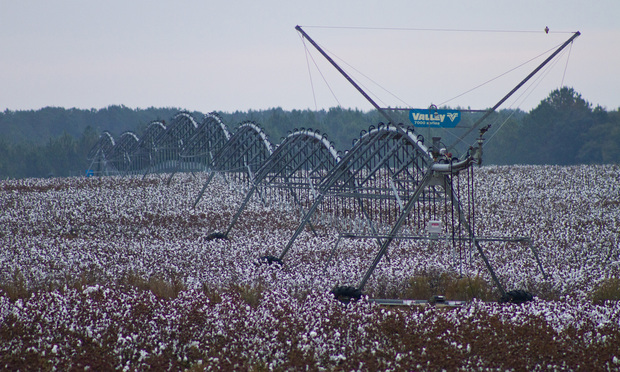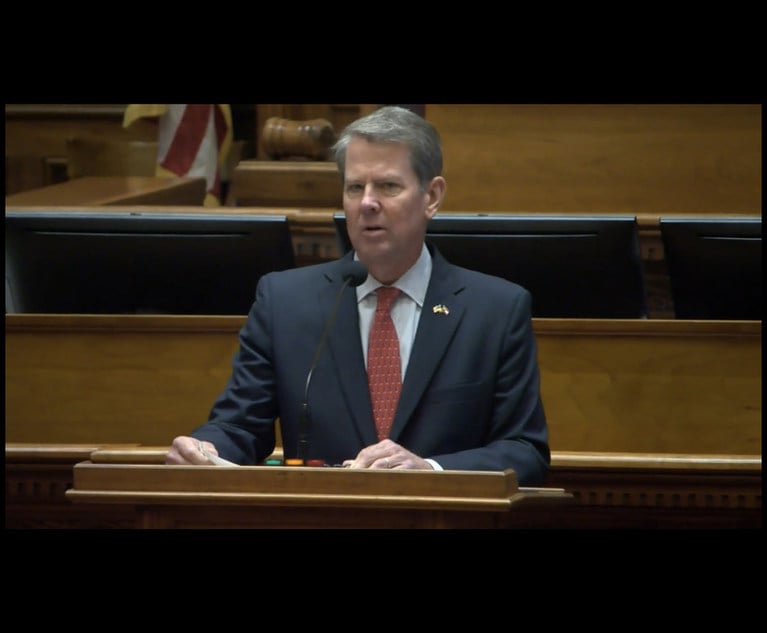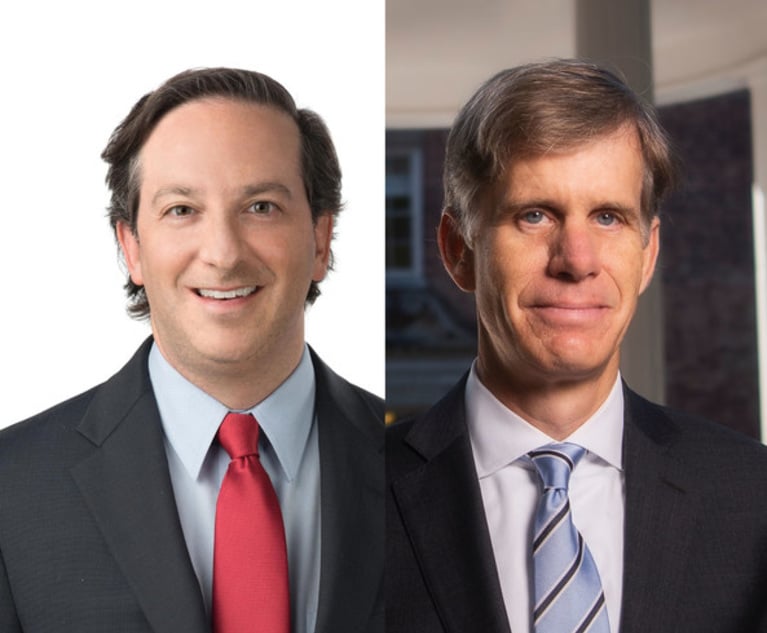Rural Georgia's 'Legal Deserts' Are Further Stressed by Pandemic
At an ABA panel about rural lawyers, Lauren Sudeall of GSU Law's Center for Access to Justice said rural Georgia has 65% of the state's population but only about one-third of its lawyers.
July 28, 2020 at 04:34 PM
7 minute read
 Cotton field in Worth County, Georgia. (Photo: John Disney/ALM)
Cotton field in Worth County, Georgia. (Photo: John Disney/ALM)
An American Bar Association panel discussion on Tuesday addressed the persistent dearth of lawyers in rural areas, including Georgia, that leaves large swaths of the population without access to justice.
The COVID-19 pandemic has stretched rural legal resources even thinner because of massive unemployment, benefits issues, looming evictions and other problems that require lawyers, said one panelist, Lauren Sudeall, director of the Georgia State University College of Law's Center for Access to Justice. (Evictions are currently stayed in Georgia, but they are expected to spike once the stay is lifted.)
The panel kicked off the ABA's release of its 2020 Profile of the Legal Profession, which for the first time features data on legal deserts by state and how law school debt affects new lawyers' job decisions, said the moderator, ABA president Judy Perry Martinez, who is of counsel at Simon, Peragine, Smith & Redfearn in New Orleans.
The other panelists included Lisa Pruitt, a law professor at the University of California, Davis, who with Sudeall co-authored a 2018 report, "Legal Deserts: A Multi-State Perspective on Rural Access to Justice" in the Harvard Law & Policy Review; and Patrick Goetzinger, who when president of the South Dakota State Bar spearheaded an innovative program to recruit new law school graduates to rural areas of his state.
Georgia Situation
Georgia has 32,548 lawyers, but most are concentrated in metro Atlanta, leaving large swaths of the state with legal deserts, where lawyers are thin on the ground. Sudeall said rural Georgia has 65% of the state's population but only about one-third of its lawyers, so it's difficult for people in those areas to secure legal representation.
For many rural residents, she added, the main option is the Georgia Legal Services Program.
Rural residents also are struggling with high levels of poverty, low literacy levels and lack of transportation, Sudeall said. "It's a dire situation."
What's more, Georgia's court system is decentralized statewide, "so there is a lot of variation [in procedures], and it's hard to impose statewide access to justice reforms," Sudeall said.
"There are a lot of misconceptions about rural America and how access to justice plays out," Sudeall added. "Rural America is not white America," she said, noting that 26% of Georgia's rural population is African-American.
With a population of 10.6 million, Georgia has on average 3.1 lawyers per 1,000 residents, well below the national average of 4 lawyers per 1,000 residents, according to the new ABA report.
But of Georgia's 159 counties, 88 have fewer than one lawyer per 1,000 residents. There are 15 counties with only one or two lawyers, according to ABA statistics, and four counties—Baker, Clay, Echols and Webster—have no lawyers.
There are fully 59 counties with 10 or fewer lawyers, Sudeall said.
That is only a marginal improvement from five years ago, when there were six rural countries with no lawyers and many with only a handful, according to a 2015 special report on rural lawyers by the Daily Report.
Researchers at GSU's Center for Access to Justice and Georgia Tech have mapped Georgia counties by population, number of attorneys, access to legal aid lawyers, poverty rate and other demographic data.
Can Tech Bridge Gap?
The pandemic has accelerated the use of remote technology to bridge the gap and help rural residents connect with a lawyer, the panelists said.
But many rural practitioners, now hard-hit by the pandemic, don't have the resources to invest in remote technology, said Pruitt, the professor at UC Davis, adding that, since they skew older, they also often don't have the incentive.
Rural courts often are similarly constrained in adopting remote technologies, Sudeall said, because it requires an investment in greater bandwidth, increased online security and software such as Zoom. The rural broadband shortage across Georgia exacerbates the issue.
"It's concerning that people can't access the courts because they don't have the technology in rural areas," she said. For instance, those in jails, which often have high rates of COVID-19 infection, often do not have access to a lawyer. "There's a direct connection to not having representation and the potential of getting a fatal disease," Sudeall said.
Debt Obstacle
High student loan debt is a major obstacle to attracting young lawyers to practice in rural areas, the panelists acknowledged.
The South Dakota State Bar in 2013 pioneered a pipeline program to recruit newly-minted lawyers for rural areas. Using funds from the state Legislature, the state bar foundation and the community, the state bar offered a five-year period of incentive payments to an initial 16 attorneys in 16 qualifying communities.
Goetzinger, the former president of the state bar there, said the aim was to "restock Main Street with lawyers." Currently, the rural recruitment program has 28 contracts filled out of 32 permanent slots, he said, and of the five attorneys who've matriculated from the program, three have elected to continue practicing in their local community.
"It's created a legal oasis for access to legal services," Goetzinger said, adding that lawyers often become leaders in these communities.
To attract more lawyers to rural Georgia, in 2015 then-State Bar of Georgia president Patrise Perkins-Hooker asked the General Assembly to approve a bill that would have offered debt forgiveness on law school loans for newly-minted lawyers who located in rural areas. But the bill never made it to the floor for a vote.
But the State Bar of Georgia has started a program that matches new lawyers with senior ones in rural areas who are looking to hand down their practices, Sudeall said. The state's law schools also offer a number of programs, such as summer and spring break externships, for rural lawyering.
Sudeall added that legal education programming generally does not take small-town generalist practices into account in either the coursework or in "teaching students the business of law—not only how to be a lawyer but how to start your own practice."
That's important, since many GSU Law graduates go to small firms or start their own practices, she said.
The legal desert problem "may not ever be solved completely, where we have a lawyer for everyone," Sudeall acknowledged. Alternatively, she suggested providing more nonlawyer guides and online legal resources to help people navigate the legal system.
The Daily Report in its 2015 series looked at how one lawyer turned librarian, Laureen Alford, turned the Dougherty County Law Library in Albany into a self-help center for people who can't afford a private attorney. (Alford moved to the county's public library system last year.)
"We need to change what access to justice means, so it's not a binary of 'Do you have a lawyer or not?'—and instead ask 'Who else can help?' to make our legal system more accessible," Sudeall said.
Katherine Tucker contributed to this report.
NOT FOR REPRINT
© 2025 ALM Global, LLC, All Rights Reserved. Request academic re-use from www.copyright.com. All other uses, submit a request to [email protected]. For more information visit Asset & Logo Licensing.
You Might Like
View All
Panel to Decide if Governor Should Suspend Georgia Lawyer From Elected Post
4 minute read


On The Move: Ex-Partner Returns to Lead Nelson Mullins Corporate Group, Burr & Forman Hires University GC as COO
5 minute readTrending Stories
- 1In Novel Oil and Gas Feud, 5th Circuit Gives Choice of Arbitration Venue
- 2Jury Seated in Glynn County Trial of Ex-Prosecutor Accused of Shielding Ahmaud Arbery's Killers
- 3Ex-Archegos CFO Gets 8-Year Prison Sentence for Fraud Scheme
- 4Judges Split Over Whether Indigent Prisoners Bringing Suit Must Each Pay Filing Fee
- 5Law Firms Report Wide Growth, Successful Billing Rate Increases and Less Merger Interest
Who Got The Work
J. Brugh Lower of Gibbons has entered an appearance for industrial equipment supplier Devco Corporation in a pending trademark infringement lawsuit. The suit, accusing the defendant of selling knock-off Graco products, was filed Dec. 18 in New Jersey District Court by Rivkin Radler on behalf of Graco Inc. and Graco Minnesota. The case, assigned to U.S. District Judge Zahid N. Quraishi, is 3:24-cv-11294, Graco Inc. et al v. Devco Corporation.
Who Got The Work
Rebecca Maller-Stein and Kent A. Yalowitz of Arnold & Porter Kaye Scholer have entered their appearances for Hanaco Venture Capital and its executives, Lior Prosor and David Frankel, in a pending securities lawsuit. The action, filed on Dec. 24 in New York Southern District Court by Zell, Aron & Co. on behalf of Goldeneye Advisors, accuses the defendants of negligently and fraudulently managing the plaintiff's $1 million investment. The case, assigned to U.S. District Judge Vernon S. Broderick, is 1:24-cv-09918, Goldeneye Advisors, LLC v. Hanaco Venture Capital, Ltd. et al.
Who Got The Work
Attorneys from A&O Shearman has stepped in as defense counsel for Toronto-Dominion Bank and other defendants in a pending securities class action. The suit, filed Dec. 11 in New York Southern District Court by Bleichmar Fonti & Auld, accuses the defendants of concealing the bank's 'pervasive' deficiencies in regards to its compliance with the Bank Secrecy Act and the quality of its anti-money laundering controls. The case, assigned to U.S. District Judge Arun Subramanian, is 1:24-cv-09445, Gonzalez v. The Toronto-Dominion Bank et al.
Who Got The Work
Crown Castle International, a Pennsylvania company providing shared communications infrastructure, has turned to Luke D. Wolf of Gordon Rees Scully Mansukhani to fend off a pending breach-of-contract lawsuit. The court action, filed Nov. 25 in Michigan Eastern District Court by Hooper Hathaway PC on behalf of The Town Residences LLC, accuses Crown Castle of failing to transfer approximately $30,000 in utility payments from T-Mobile in breach of a roof-top lease and assignment agreement. The case, assigned to U.S. District Judge Susan K. Declercq, is 2:24-cv-13131, The Town Residences LLC v. T-Mobile US, Inc. et al.
Who Got The Work
Wilfred P. Coronato and Daniel M. Schwartz of McCarter & English have stepped in as defense counsel to Electrolux Home Products Inc. in a pending product liability lawsuit. The court action, filed Nov. 26 in New York Eastern District Court by Poulos Lopiccolo PC and Nagel Rice LLP on behalf of David Stern, alleges that the defendant's refrigerators’ drawers and shelving repeatedly break and fall apart within months after purchase. The case, assigned to U.S. District Judge Joan M. Azrack, is 2:24-cv-08204, Stern v. Electrolux Home Products, Inc.
Featured Firms
Law Offices of Gary Martin Hays & Associates, P.C.
(470) 294-1674
Law Offices of Mark E. Salomone
(857) 444-6468
Smith & Hassler
(713) 739-1250






